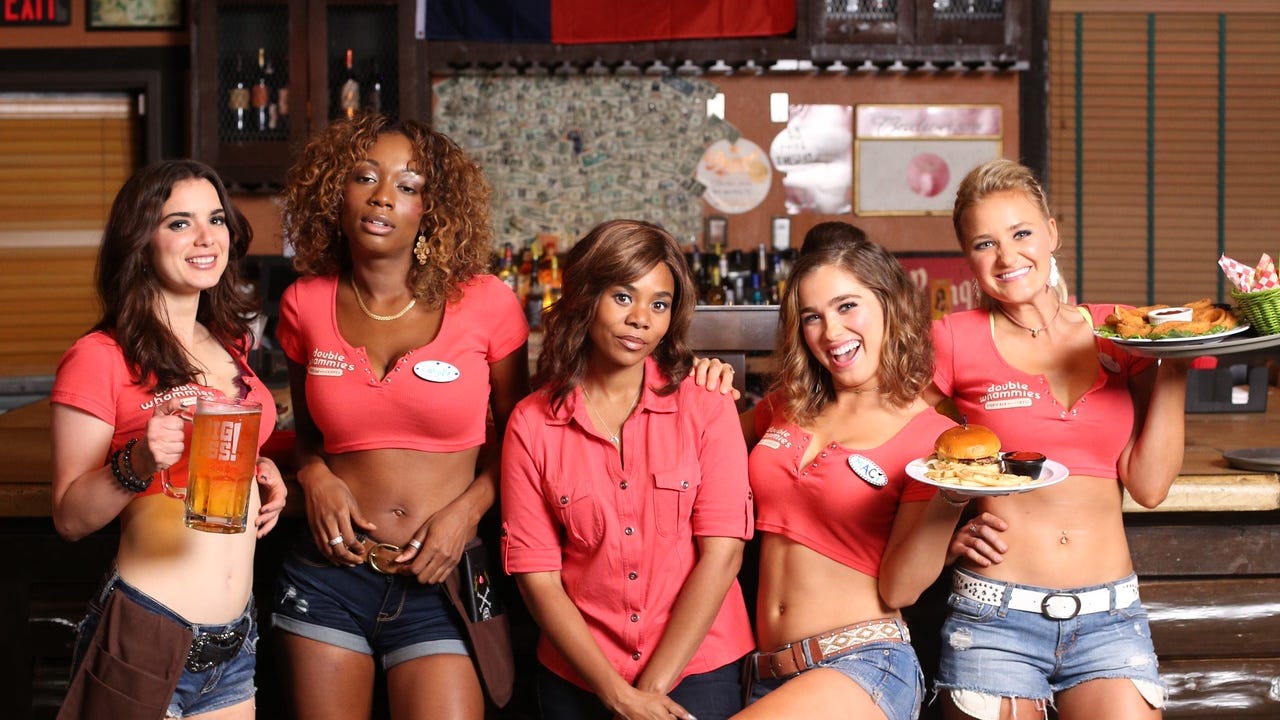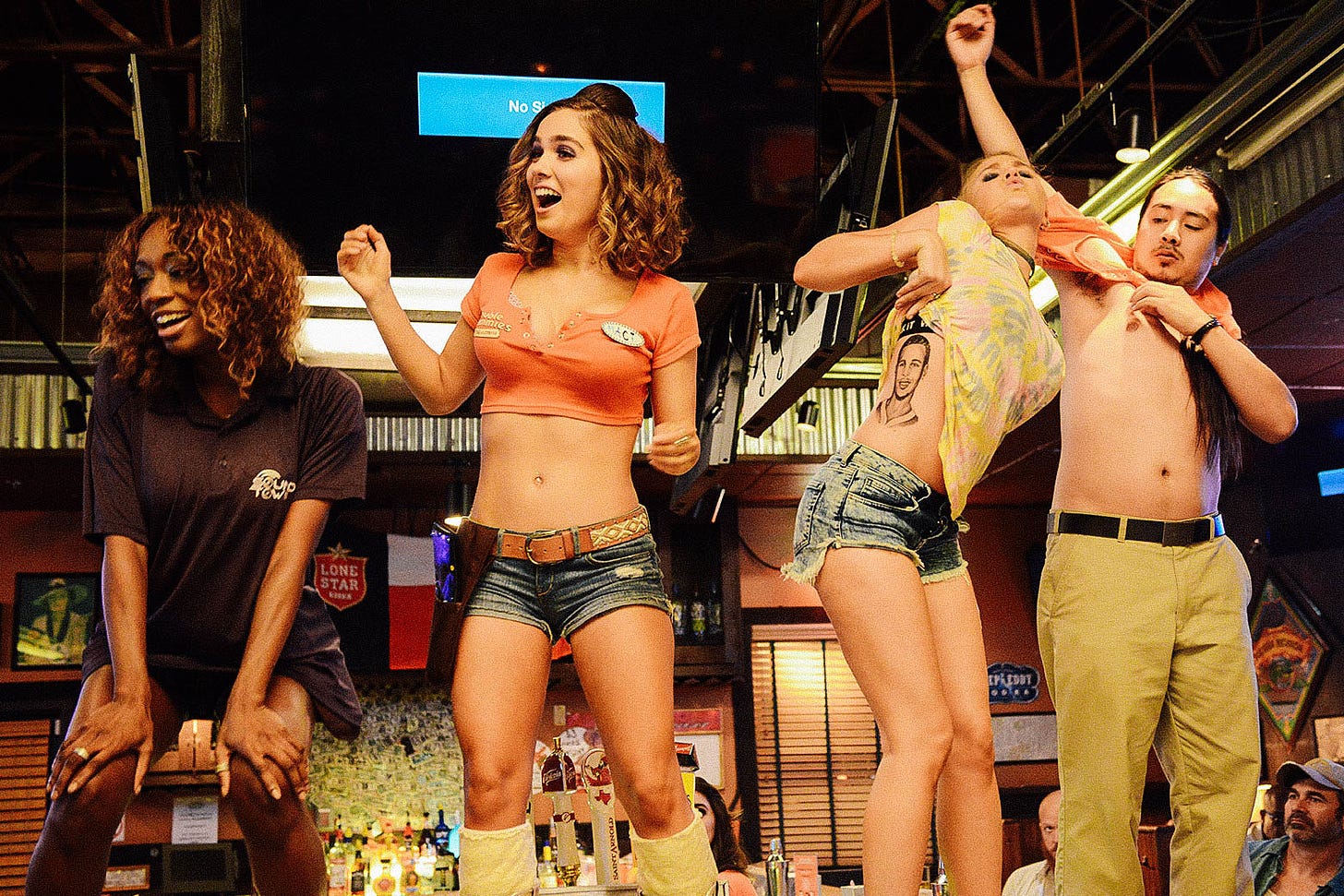The New Cult Canon: 'Support the Girls'
Andrew Bujalski's comedy about a day-in-the-life of a boobs-and-brews "breastaurant" is one of the great modern films about American labor.
“I love being professional. That’s always, like, huge for me.” — Dylan Gelula, Support the Girls
Andrew Bujalski’s Support the Girls takes place in an alien world—a world where people get paid by the hour and have no benefits, a world where they have to make rent on shitty apartments with scuffed walls and worn beige carpets, a world that chips away at their dignity and self-respect. This is an alien world because we do not see it nearly as often on screen as worlds with aliens in them, which is a Hollywood problem that’s shared, to some degree, by American independent films that feel conspicuously disconnected from lived experience. With Support the Girls, his extraordinary slice-of-life about the manager of a downscale Hooters-like restaurant called Double Whammies, Bujalski has made one of the definitive modern films about labor. And he’d have earned that distinction even if he had more competition.
It has been Bujalski’s mission from the start to approximate real life to a granular level, down to the “ums” and “likes” and “you knows” that pepper everyday conversation, but tend to get smoothed out in the scripting stage. I happened to see his debut feature, Funny Ha Ha, a year before it picked up a proper distributor, when Facets, a small single-screen theater/film center/video store here in Chicago, gave it a week-long run. If Bujalski’s style was immediately off-putting—as I noted in the lede to my review—that's only because it takes time to recalibrate your thinking about the style that would come to be known as “mumblecore,” a movement of ultra-low-budget cinema that would expand beyond Bujalski, but never improve on him. By the time Funny Ha Ha gets to an afternoon date sequence that ends on a note of startling offhand hostility, it feels so uncannily real that it’s like watching a quiet reinvention of the medium. I was legitimately thunderstruck; it may be the single greatest discovery of my career.
Bujalski would go on to justify my love in two subsequent films, 2005’s Mutual Appreciation and 2009’s Beeswax, that continued in the same stylistic vein, which owed something to the technique of John Cassavetes, but to much more low-key ends. After Bujalski moved south from Boston to Austin, he opened up his improvisatory techniques a little more for the superb 2013 science-fiction comedy Computer Chess, which deployed legitimate analog video cameras to add a different kind of verisimilitude to his period piece about 1980 computer nerds who test their chess programs against each other at a conference in California.
But the truer companion to Support the Girls was his underrated 2015 film Results, which squared his down-to-earth sensibility with a more commercially palatable relationship comedy, built around recognizable faces like Cobie Smulders, Guy Pearce and Kevin Corrigan. As I wrote in my appreciation of Results for The Guardian, both films “dig into the quirky ecosystems of suburban businesses” and feature employees who “absorb the petty indignities of customer service, screw around during pockets of downtime, and casually eye the next gig that comes along.”
Support the Girls builds significantly on Results, in part because Bujalski puts the workplace at the center of the film, so we can appreciate not only how it operates, but its outsized role as a social and emotional hub in its employees’ lives. It wouldn’t be quite right to call the film a screwball comedy, but Bujalski does whip up a deftly orchestrated chaos around a manager whose routine involves so much more than the common drudgery of scheduling and timesheets. Over the single day in which the film takes place, Lisa (Regina Hall), the boss and benevolent den mother of Double Whammies, has to keep the operation staffed up and running, but her list of unofficial duties runs quite a bit longer than the breastaurant’s inept owner, Ben Cubby (James Le Gros) will ever appreciate.
During a morning orientation session, Lisa skips right past Rule #1—“NO DRAMA”—because she knows that a staff of young women in their early twenties will bring plenty of it, and it’s part of the job to put those fires out. In order for her star employee Danyelle (Shayna McHayle) to make her shift, for example, someone has to look after her son, because Danyelle can’t afford childcare on an hourly wage and she can’t afford to miss a shift, either. So Lisa scrambles to find someone else on staff to look after the boy on her day off. Also on the to-do list: Auditioning half a dozen potential employees; dealing with a thief who got stuck in the vent above her office; firing a waitress who got a Steph Curry tattoo on her midsection, violating the no-tattoo policy; getting the cable company to fix the signal before a big fight later that night; and running an off-the-books car wash to raise money for Shaina, another waitress who hit her abusive boyfriend with her car and is facing huge legal and medical bills. (She’s currently living in Lisa’s place, too.) On top of that, her marriage is falling apart and she has to step out briefly to look for a suitable apartment for her husband to live in.
There are moments here that recall the Martin Scorsese film Alice Doesn’t Live Here Anymore, with its feeling of esprits de corps among working women whose jobs often involve fending off men who try to extend the boundaries of customer service. But the boundless warmth of Support the Girls seems more in line with Jonathan Demme, who was great at ensemble pieces that celebrate the fullness of humanity, all the way down the cast. Minor subplots here could be spun off into independent films of their own, like Maci (Haley Lu Richardson), the bubbliest of the servers, having a relationship with a sweet old professor who’s at least three times her age, or Arturo (Steve Zapata), a short-order cook who Lisa has to fire when she recognizes the burglar as his cousin. (In maybe the most touching moment of the film, Lisa tells Arturo that she’s decided to be generous to him today. He replies, quietly, “You’re generous every day, Lisa.”)
From the opening credits, which places candy-colored cursive titles (with hearts over the i’s) over a concrete jungle of highways, overpasses, and exit ramps, Bujalski gives the boobs-and-brews frivolity of Double Whammies a strong grounding in the real world. Without hammering the point home, Bujalski keeps revealing cracks in the system that make life for working people challenging, if not impossible: Danyelle needing to bring her sick kid to work; Lisa quietly letting Arturo go rather than alerting the police or her boss to his connection to the thief, so he can pick up another job (she even offers him a reference!); Shaina facing legal bills she can’t pay, on top of using Lisa’s place as a domestic abuse shelter; and the looming threat of new corporate competitor, ManCave, putting them all out of a job.
The greatness of Lisa as a manager is that she accounts for all these variables—as well as the certainty of young women making mistakes—but it should go without saying that she shouldn’t have to do it. What’s galling about her boss Ben is that he doesn’t appreciate the off-the-books favors that Lisa does for her “girls,” but expects her to abide by his own icky labor workarounds, like never scheduling more than one Black server on the same shift. And what’s she going to do about it? Support the Girls winds up being about her last day on the job, when Ben finally makes good on his threats to fire her, and it’s not as if she’s in any great position to miss paychecks, either.
It shouldn’t seem like such a radical gesture for a filmmaker to give some thought about the lives of people with shit jobs, but Support the Girls pulls it off without a whiff of didacticism. Bujalski doesn’t need to say that a system that gives no protections to these women—in a workplace that makes them uniquely vulnerable to boot—isn’t great, and that a culture where Lisa acts as a mother to a surrogate family isn’t great, either. Yet a family they most certainly are, and the film can sometimes feel like a domestic comedy where all sorts of chaos is happening under the same roof. Double Whammies isn’t NO DRAMA but nearly ALL DRAMA, plus a little bit of goofing off in the downtime. A bit where Maci surprises Lisa with an affirmative cheer (“You’re the best and we love ya!”) and a confetti cannon captures the film’s spirit in a nutshell.
Support the Girls reserves its best scene for last, as Maci and Danyelle, having lost their jobs at Double Whammies in solidarity with Lisa, coax Lisa onto the roof of an office building where all three have just interviewed for a new ManCave location. There’s no indication that life at a corporate version of the place they just left would be any better—the woman interviewing Lisa laughs about the endless turnover she can expect—but they left their old jobs with a bottle of liquor from behind the bar as a souvenir and now’s the time to drink away their troubles.
This moment of women out sunning themselves nods to the scene in Alice Doesn’t Live Here Anymore where Ellen Burstyn and Diane Ladd bond off the clock at Al’s, the diner where they’re harassed all day by their customers and their boss. Here, the three women have the space to joke and reminisce a little, but at a certain point, they seem to realize that they are free— between jobs, serving no one, with no men around to hassle or second-guess them. And so, they scream, muffled by the roar of the highway below. Maci gives a “party scream,” but Danyelle shuts her down. She gives a horror scream, an exorcism of frustrated energy. Maci follows, and Lisa is summoned to give her barbaric yawp, too. It feels great to let it out. It was a long time coming.
Next: Memories of Murder







One of my favorite movies from 2018. Haven't seen Results or Computer Chess, but I see something interesting - Bujalski maybe has one of the widest gaps between critic and audience gaps (Rotten tomatoes critics/audience scores):
Support the Girls: 91/60
Results - 85/36 (!)
Computer Chess - 88/53
Wonder why that is... It seems like the audiences are expecting a different movie than what is portrayed by the trailer?
Beeswax I loved, too. FYI, 75/43. Go figure.
Great job with this, Scott!